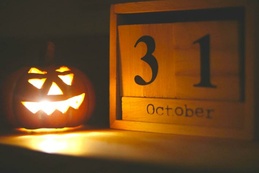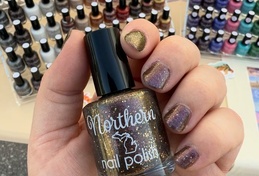
Meet the Karens
Nine local leaders respond to the “Karen stereotype”
By Art Bukowski | July 5, 2025
Every so often, Northern Express includes stories suggested by readers. This is one such story, and it came from Ada Takacs. In her words:
“I have been hearing folks refer to ‘Karen’ in a derogatory sense for a few years, with many online comments referring to ‘Karens.’ I got the idea for the article when a man responded to a social media post and said “My 10-year-old daughter is named Karen, please stop using her name this way.” … Karens are our grandmas, moms, sisters, aunts, librarians, nurses and much more. We should give them the respect they deserve.”
So...what’s in a name? If you’re a Karen these days, perhaps a bit more than you’d like.
Karen was one of the top 10 names for Baby Boomer and Generation X girls, peaking at number three in 1965 before dropping wayyyyyy down to around 600th today, according to The New York Times.
And for most of their lives, these Karens went about their business just as any Leslie, Jennifer, or Susan might. Nothing to see here. But by 2020, the term had become commonplace (particularly on the internet) as a slur to describe middle class, uppity women who are prone to telling other people how to behave or what to do. These are the women who want to see your manager—now!
The whole thing is, of course, absurd. A person’s actions are in no way determined by their name, and the vast majority of Karens are no better or worse than any of their peers. But you can’t put the meme back in the box, and they are now dealing with this phenomenon whether they’d like to or not.
We connected with several high-performing Karens in the region to discuss this nagging stereotype and what it means to them.
Karen Roofe
Owner of My Secret Stash and I’m Planty AF in Traverse City, Vice President of Up North Pride, and Vice President of the Downtown Traverse City Association (DTCA – the downtown merchant’s group)
Express: What do you think of the stereotype?
Regarding the Karen stereotype, I jokingly introduce myself as “like the evil internet lady” in jest, and it usually gets a good laugh and acts as an icebreaker. Once people get to chat with me, they know me as jovial and helpful. The stereotype hasn’t really affected me, except that it’s a fun joke. Certainly, when someone “wants to speak to the manager,” I’m quite happy to say, “I’m Karen. Let’s do this!” More chuckles ensue.
Express: Are you trying to change the narrative?
The only thing I’m doing to combat the stereotype is laugh with it and be myself. Personally, I think it is hilarious and sometimes true. For the community at large, I volunteer to bring balance and energy to my life and those that I interact with.
Karen Schmidt
Board chair of The Botanic Garden at Historic Barns Park
Express: What do you think of the stereotype?
The Karen stereotype is the opposite of everything I believe in: treating people with kindness and respect, appreciating the importance and beauty of diversity, serving as a role model for children. Every time I read about a “Karen” situation where someone is cruel, racist, demanding, I want to shout, “Don’t take my name in vain—that doesn’t describe who I am or what I do.”
Express: Are you trying to change the narrative?
There are so many wonderful Karens out there. I know a number of them and see their goodness and the gifts they bring to others. That’s the Karen I strive to be.
Karen McCarthy
Licensed Professional Counselor (LPC) and Certified Clinical Trauma Professional, owner, Bright Water Counseling
Express: What do you think of the stereotype?
Social trends like the Karen stereotype are inevitable and uncontrollable. I’m not sure why my name has become associated with the image of a pushy, entitled white woman, but here we are. At first it bothered me and I used a hashtag “#notallKarens” but I realized that doing so invalidates the very real social problem of weaponizing privilege for selfish ends. Rather than pushing back against the stereotype, it’s my role as a privileged, educated, middle-class white woman to use the trend to work towards a culture of valuing diversity, equity, and inclusion.
Express: Are you trying to change the narrative?
The Karen stereotype has actually provided me with a way to engage in conversation about privilege. When I introduce myself, I now say “My name is Karen, but I’m not a Karen!” It breaks the ice and helps me gauge people’s awareness!
Karen Johnston-Jackson
Registered Nurse, Munson Medical Center – Cowell Family Cancer Center
Express: What do you think of the stereotype?
I first became a nurse in the late ’90s when there wasn't the Karen stereotype of today. I don’t believe in stereotypes and hate that my name is associated with a bossy, middle-aged woman with a short haircut, chronically complaining, who can’t be satisfied. My patients really don’t comment on my name. Doctors and coworkers on the other hand, well, that could be a different story. As far as my family and friends go, they think I act more like a “Jennifer” or a “Shannon” or a “Kiki.”
Express: Are you trying to change the narrative?
I try to treat everyone with respect and kindness. I treat people the way that I would want someone to treat my mom, dad, or grandmother. Respectfully, with care and dignity. You never know what someone’s story is and even the “Karens” deserve to be treated with respect and kindness. This is my approach on how I practice at work and the way that I practice life.
Karen Browne
President and CEO, TBA Credit Union
Express: What do you think of the stereotype?
The stereotype is not who I am and has had no impact on me.
Are you trying to change the narrative?
No, I have better things to focus my time on.
Karen Puschel Segal
Retired United States diplomat, now leads a local team resettling families from Afghanistan
Express: What do you think of the stereotype?
I’ve never been thrilled by my name. I think it’s because of the way Karen is pronounced in the Midwest. That flat “a” sound made in the back of your throat. Europeans tend to pronounce it with a soft “kah-run” which sounds so much nicer, kinder. So when Karen became a slur (always pronounced with a hard "care" sound), sure it made me even more sensitive. It sounds jarring plus now there’s a negative image attached to it! Blech.
Express: Are you trying to change the narrative?
After stressing about it to my son, I happened to attend a powerful film at the State Theatre focused on racial stereotypes. After, I called my son and said my issues were nothing compared to what others had to deal with. So I stopped talking about it.
Kabie (formerly Karen) Stein
Editor, Creative Director at Here:Say Storytelling
Express: What do you think of the stereotype?
It was irritating when “Karen” meant “annoying woman” and then grating when it leveled up to mean “irredeemably entitled woman” or worse. So a couple years ago, I jokingly suggested resurrecting a childhood nickname, Kabie, and was surprised people actually started using it. But when half the room said “Hi, Kabie” and the other half “Hi, Karen” at Here:Say shows, I knew I had to decide how serious I was about it. Then while traveling, a Lyft driver greeted me with “Hi, Karen” and—without missing a beat—Alexa chimed in through the speakers: “Karen … pejorative slang term … middle-aged white woman … entitled or excessively demanding.” Umm, yeah, call me Kabie.
Express: Are you trying to change the narrative?
I’ve ended up in conversations about the Karen thing when someone has asked why I’m now Kabie or when someone I’m decently acquainted with has used the pejorative in my presence and I responded with “c’mon… really?” Those folks have often left the conversation with a better understanding of why we actually-named-Karens hate it so much, but I don’t have illusions that there’s any hope of moving the needle on this one. It’s proven to be a pretty durable meme.
Karen Hampel
Office coordinator for 13th Circuit Court Records Office
Express: What do you think of the stereotype?
Not sure how the Karen stereotype even got started, but I truly don’t pay attention to all the nonsense that is out on social media. I think everyone has a little “Karen” in them. I think women that speak up for themselves are strong, independent women.
Express: Are you trying to change the narrative?
In my experience, you are not going to change people’s minds about things like this. The world has become very opinionated on numerous things, and I choose to live my life without worrying about those kinds of people.
Karen Anderson
CEO of Cordia at Grand Traverse Commons
Express: What do you think of the stereotype?
I pay zero attention to the Karen stereotype. I could not even accurately describe it for you. It is much more important for me to focus my energy on the community we foster at Cordia. I am fortunate to be surrounded by family, friends and colleagues who also pay no attention to this odd social stereotype.
Express: Are you trying to change the narrative?
Honestly, I am much more concerned with changing the narrative in regards to the outdated stereotypes of aging and senior living. The later years can be a time of continued growth, meaningful connections, and personal fulfillment. It’s time to change the narrative and celebrate the richness of this chapter of life.
Trending

13 Spooky Happenings Up North
It’s hard to find a town or village that does not have some sort of Halloween fun planned for residents and visitors. … Read More >>
Thrills & Chills in Cadillac
Cadillac is ready for its Halloween closeup this week! Take the kiddos to the Downtown Trick or Treat on Mitchell Street fro… Read More >>
Howling at the Moon
Your Halloween costume needs one final touch…and Northern Nail Polish has you covered. This Traverse City-based brand… Read More >>


